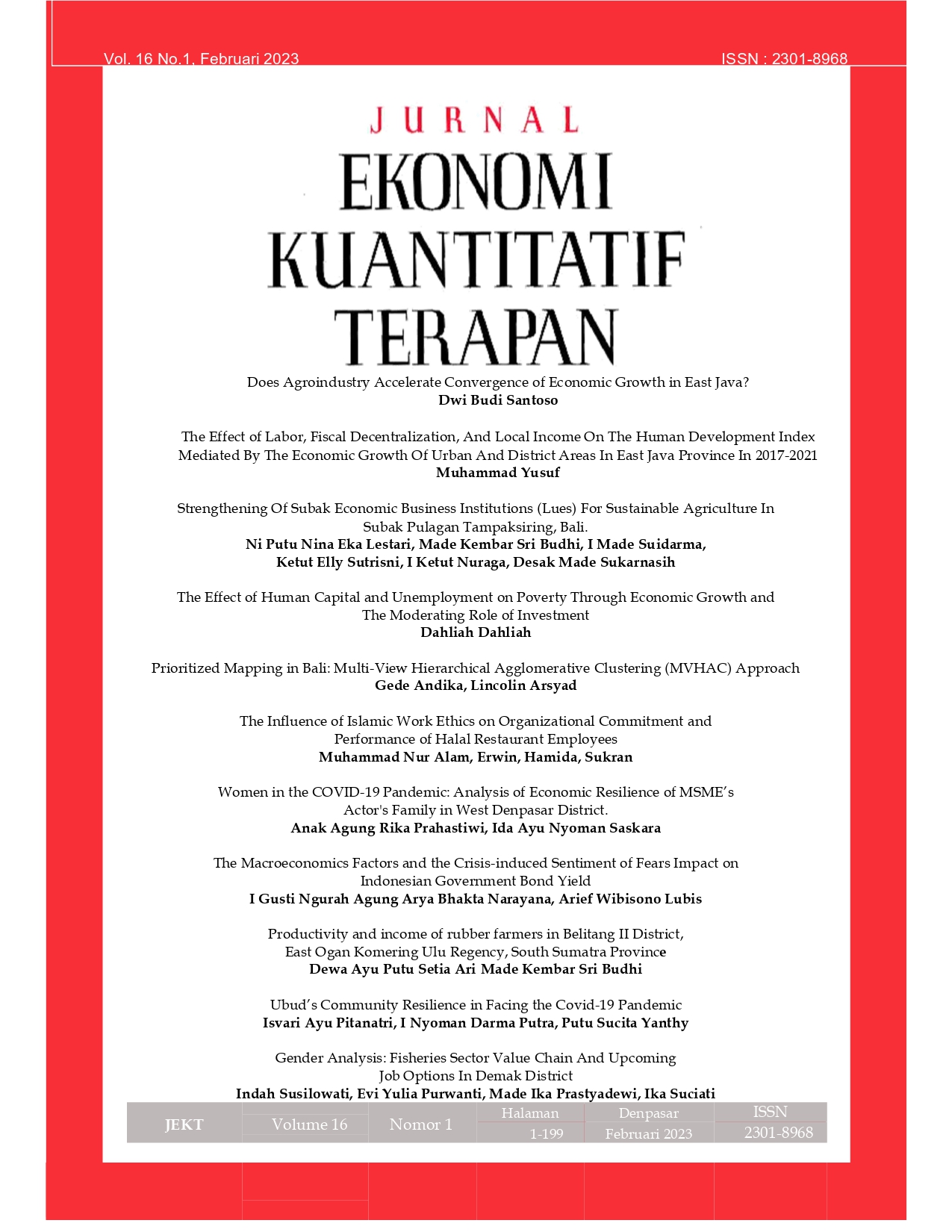The Influence of Islamic Work Ethics on Organizational Commitment and Performance of Halal Restaurant Employees
Abstract
This study aims to determine the application of Islamic work ethics by employees who work in halal-certified restaurants in DKI Jakarta on organizational commitment and performance. This study uses the Partial Least Square (PLS) analysis test with 161 samples from employees of halal restaurants in DKI Jakarta. From the research conducted, the researcher found that Islamic work ethic was statistically proven to have a positive effect on affective commitment, continuance commitment, and normative commitment. Islamic work ethic is also statistically proven to have a positive effect on employee performance. Affective commitment and continuance commitment are not proven to have an effect on employee performance (job performance). The normative commitment variable has been shown to have a positive effect on employee performance (job performance).
Downloads
References
2. Abdi, MF, Muhamad Nor, SF, & Radzi, NZ (2014). The impact of Islamic work ethics on job performance and organizational commitment. Proceedings of 5th Asia-Pacific Business Research Conference, 1–12. Retrieved from
3. Ali, A. (1988). Scaling an Islamic work ethic. The Journal of Social Psychology, 128 (5): 575–583.
4. Ali, AJ, & Al Owaihan, A. (2008). Islamic work ethic: a critical review. Cross Cultural Management: An International Journal, 15 (1): 5–19.
5. Allen, N.J. dan J.P. Meyer. 1991. The Measurement and Antecedents of Affective, Continuance and Normative Commitment to the Organizational. Journal of Occupational Psychology. 63 (1): 1-18
6. Forquesato, P. (2016). Social norms of work ethics and incentives in organizations. Journal of Economic Behavior and Organization, 128 (99999): 231–250.
7. Haryono, Siswoyo. 2017. Metode SEM Untuk Penelitian Manajemen Dengan. AMOS LISREL PLS. Luxima Metro Media.
8. Hayati, K., & Caniago, I. (2012). Islamic Work Ethic: The Role of Intrinsic Motivation, Job Satisfaction, Organizational Commitment and Job Performance. Procedia-Social and Behavioral Sciences International Congress on Interdisciplinary Business and Social Science, 65 (ICIBSoS): 272–277.
9. Imam, A., Sattar Abbasi, A., & Muneer, S. (2013). the impact of Islamic work ethics on employee performance: testing two models of personality X and personality Y. Sci.Int (Lahore), 25 (3): 611–617.
10. Manan, SK, Kamaluddin, N., & Puteh Salin, ASA. (2013). Islamic work ethics and organizational commitment: Evidence from employees of banking institutions in Malaysia. Pertanika Journal of Social Science and Humanities, 21 (4): 1471–1489.
11. Mowday, RT, Steers, RM, & Porter, LW (1979). Measurement of organizational commitment. Journal of Vacational Behavior 14: 224-247.
12. Murti dan Hudiwinarsih. 2012. Pengaruh Kompensasi, Motivasi dan komitmen Organiasial Terhadap Kinerja Karyawan Bagian Akuntansi Studi Kasus Pada Perusahaan Manfukatur di Surabaya. ISSN 2086-3802, volume 2 STIE Perbanas Surabaya
13. Rawwas, MYA, Javed, B., & Iqbal, MN (2018). Perception of politics and job outcomes: moderating role of Islamic work ethic. Personnel Review, 47 (1): 74–94.
14. Rokhman, W. (2010). The Effect of Islamic Work Ethics (IWE) on Work Outcomes. Electronic Journal of Business Ethics and Organization Studies, 15 (1): 21–27.
15. Salahudin, SN bin, Baharuddin, SS binti, Abdullah, MS, & Osman, A. (2016). The Effect of Islamic Work Ethics on Organizational Commitment. Procedia Economics and Finance, 35 (October 2015): 582–590.
16. Steers, Richard M. (1977). Efektivitas Organisasi. Seri Manajemen No. 47, Jakarta: Erlangga
17. Taurisa, C.M dan Ratnawati, Intan. (2010). Analisis Pengaruh Budaya Organisasi dan Kepuasan Kerja Terhadap Komitmen Organisasional dalam Meningkatkan Kinerja Karyawan (Studi pada PT. Sido Muncul Kaligawe Semarang). Jurnal Bisnis dan Ekonomi (JBE): 170 – 187.
18. Vignaswaran, R. (2008). The Relationship between Performance Appraisal Satisfaction and Employee Outcomes: A Study Conducted in Peninsular Malaysia.
19. Yousef, DA (2001). Islamic work ethic–A moderator between organizational commitment and job satisfaction in a cross-cultural context. Personnel Review, 30 (2): 152–169.




















